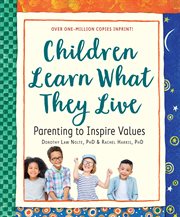Nonfiction
eBook
Details
PUBLISHED
Made available through hoopla
DESCRIPTION
1 online resource
ISBN/ISSN
LANGUAGE
NOTES
The timeless New York Times bestselling guide to parenting that shows the power of inspiring values through example. A unique handbook to raising children with a compassionate, steady hand-and to giving them the support and confidence they need to thrive. Expanding on her universally loved poem "Children Learn What They Live," Dorothy Law Nolte, with psychotherapist Rachel Harris, reveals how parenting by example-by showing, not just telling-instills positive, true values in children that they will carry with them throughout their lives. Addressing issues of security, self-worth, tolerance, honesty, fear, respect, fairness, patience, and more, this book of rare common sense will help a new generation of parents find their own parenting wisdom-and draw out their child's immense inner resources. If children live with criticism they learn to condemn. If children live with sharing, they learn generosity. If children live with acceptance, they learn to love. And more wisdom. Rachel Harris, L.C.S.W., Ph.D., is a psychotherapist who completed postgraduate training in family therapy and parenting education. She lives with her teenage daughter in Princeton, New Jersey. Rachel has know Dorothy Law Nolte for almost 30 years as teaching associates and co-workers. Dorothy Law Nolte, Ph.D. is a lifelong teacher and lecturer on family life education, and is the author of the poem "Children Learn What They Live," which has been translated into 20 languages and is used the world over by parents and educators. The mother of three, grandmother of three, and great grandmother of five, she lives and works in southern California. (From the chapter "If children live with acceptance, they learn to love") We use the word "love" to describe the most dynamic and vital human experience there is. What we call love is bigger than anything we can say about it. And most people would agree that there is nothing more important in life than to love and be loved. When we wholeheartedly love our children and accept them unconditionally, they thrive. Love is the soil in which our children grow, the sunlight that determines their direction, the water that nourishes their growth. Children need love from the moment they are born-and even before that. Newborns are totally dependent on our warmth, affection, and loving attention. Our active caring nurtures their feelings of being wanted and belonging. As children mature, they continue to rely on us to show them we love them. They best understand love through our kind and caring actions. Our total acceptance of them is the wellspring of our love. While it is imperative for our children to feel loved, love is a fundamental human need that we never outgrow. As adults, we still want to be wanted. We still need human connection, closeness, affection, and a warm touch. We all want to be accepted for being who we are, and to have friends with whom we feel we belong Our children know they are wanted and loved when we treat them kindly, and when we accompany loving actions with loving words and nurturing touch. It is not enough to say "I love you." In working with parents, I often talk about the three A's of love: acceptance, affection, and appreciation. Our children need to live in an atmosphere where they feel confident that they will always be accepted and loved despite their shortcomings. When they are loved in this way, they will be able to mature in their ability to love others. Unconditional Acceptance Teaches Love The root of the word "acceptance" is "to bring to ourselves"-to receive. When we are accepting, we teach our children they are wanted and loved. We convey our love with smiles, hugs, kisses, and pats, with the warmth of our affection, day in and day out, through all the years of childhood and into their adulthood. When we accept ou
Mode of access: World Wide Web







